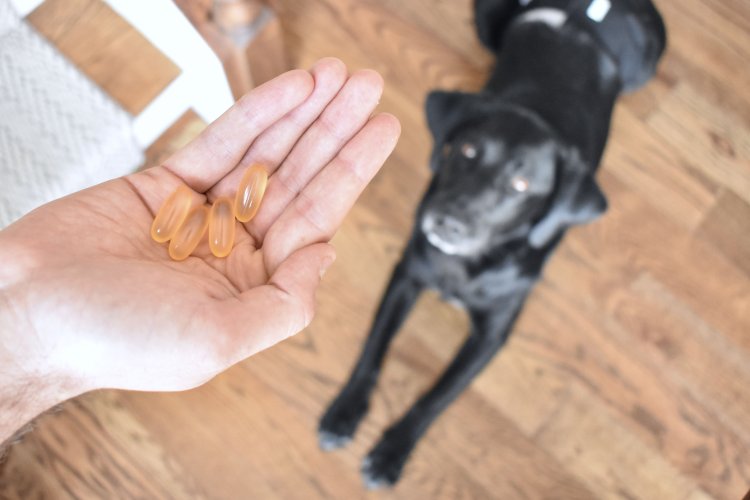Fish Oil For Dogs: A Comprehensive Guide For All Your Whats, Whys, and Hows
To help ease your mind, this comprehensive blog will help you understand everything about omega-3 fish oil for dogs. Let’s start with the basics and see whether you should use fish oil as a treat for your canine friend.
Share this Post to earn Money ( Upto ₹100 per 1000 Views )

Do you need fish oil for dogs, or is it just another overrated canine supplement that does not have reliable effects? Being wary of introducing anything new to your furry friend’s diet is normal, and all dog lovers have been at that stage at one time or another. But this does not mean you can entirely rule out the potential benefits of dog supplements, especially for puppies and seniors.
To help ease your mind, this comprehensive blog will help you understand everything about omega-3 fish oil for dogs. Let’s start with the basics and see whether you should use fish oil as a treat for your canine friend.
Is Fish Oil Good For Dogs?
Before considering the usage of fish oil for your canine friend, let’s understand what it actually is. Fish oil is fatty oil from the bodies of fishes, used in the manufacture of many products, and consists of the oil and water pressed from cooked fish during the manufacture of fish meal, says Britannica. Fish oil for dogs is full of omega-3 fatty acids necessary for canines’ health and wellness. The EPA and DHA present in fish oil makes it highly useful for dogs, promoting healthy skin and boosting immunity.
Fish Oil For Dogs Benefits
Experts recommend fish oil as the most effective dog hip and joint supplement. Moreover, it is also one of the most affordable sources of canine omega-3 fatty acids, which are crucial for a dog’s health but can not be produced by its body. Using fish oil supplements for dogs is associated with the following health benefits.
Promotes Healthy Skin and Coat
salmon fish oil for dogs is rich in essential fats, including omega-3, which can improve dogs’ skin and coat health by reducing dryness, itchiness, and shedding. Dogs suffering from skin allergies and infections, including pododermatitis and hotspots, can significantly benefit from canine omega-3 supplements.

Supports Joint Health and Mobility
All dog breeds suffer from hip and joint problems, but some, such as Dachshunds, Bulldogs, and German Shepherds, have even higher chances of suffering. Along with a balanced diet, regular exercise, and hip and joint supplements, these can be effective in preventing and treating such problems. “The supplement with the most support in the literature currently is omega-3 fatty acids from fish oil,” Dog expert Dr. Christopher Fyre explains. “Dosing has been fairly well-studied, and a recommended daily dose of 1 teaspoon per 20 pounds of ideal dog weight is recommended.”
Speeds Up Wound Healing
A 2014 study notes that omega-3 polyunsaturated fatty acids in fish oil have profound effects on wound healing and infections. Not only that, fish oil for dogs can also affect outcomes involving wound healing and infections, as well as incidence and outcomes in cardiovascular disease, diabetes, organ transplant rejection, and other inflammatory conditions. If you have a goofy pup that runs on high energy and has greater chances of injuries, fish oil supplements can significantly help.
Strengthens Immune System
Prevention is better than cure; nothing beats a robust immune system for keeping your canine friend safe and healthy. Boosting immunity is one of the main reasons why experts stress a balanced diet and regular exercise for both pets and their owners. However, apart from those, essential nutrients such as vitamins, minerals, and fats, especially omega-3 fatty acids, are crucial for a robust immune system. Fish oil for dogs, being the safe source of these essential acids, plays a significant role in strengthening the canine immune system.

How Much Fish Oil Should I Give My Dog?
The saying, “the more, the merrier,” can never be applied to dog diets and supplements. Often, over-dosage can reverse the effects and lead to health issues, which make the situation even worse than it could ever have been. The same goes for canine fish oil, where dosage is crucial in deciding the effects on your canine friend’s health.
According to Colorado State University, the maximum daily dosage of fish oil for animals with osteoarthritis is 310 mg/kg0.75 of EPA/DHA per day. However, All animals do not tolerate the maximum dose, and a lower dose may be preferable. A recommendation is to start with approximately a quarter of the maximum dose and then increase the dose slowly while monitoring for any side effects (such as loose stools and vomiting).
|
Dog weight (lbs) |
Dog Weight (kg) |
Recommended dose (mg) of combined EPA/DHA for osteoarthritis |
|
5 |
2.3 |
574 |
|
10 |
4.5 |
965 |
|
15 |
6.8 |
1308 |
|
20 |
9.1 |
1623 |
|
25 |
11.4 |
1919 |
|
30 |
13.6 |
2200 |
|
35 |
15.9 |
2469 |
|
40 |
18.2 |
2730 |
|
45 |
20.5 |
2982 |
|
50 |
22.7 |
3227 |
|
55 |
25 |
3466 |
|
60 |
27.3 |
3700 |
|
65 |
29.5 |
3929 |
Colorado State Univerity: Fish Oil For Dogs Dosage Chart
Fish Oil For Dogs Side Effects
An important question to consider is whether fish is 100% safe for your furry friend or if there are any chances of side effects. Experts believe fish oil for dogs overdosing; however, over dosage can cause side effects such as diarrhea, vomiting, delayed wound healing, sleepiness, a fishy odor to the breath or skin, increased itchiness, or an oily coat and skin flakes.
Veterinarians at Colorado State University advise pet owners to opt for “products that evaluate for purity and freshness via third-party testing. While fish oil is generally benign and safe, certain side effects beyond weight gain and vomiting/diarrhea are possible. If your animal has health issues other than osteoarthritis, or if you have any other questions or concerns, contact your primary care veterinarian.”
Adding to it, dog experts explain, “Quality products will display amounts of EPA and DHA on the label. A convenient way of providing fish oil is to purchase a high-quality joint diet. Other ingredients included with specific fish oil formulations may be harmful to pets. Some non-veterinary formulated supplements may not be appropriate for your pet and can even be harmful!”
















